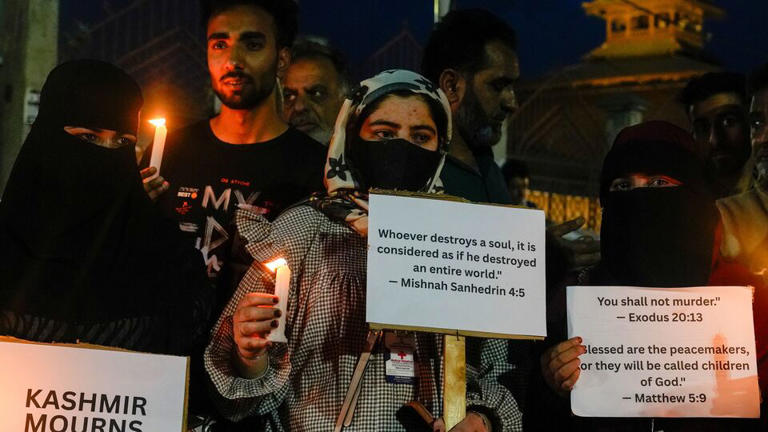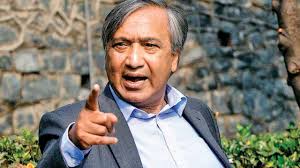A Valley’s Heartbeat Echoes Stronger
By: Javid Amin
Srinagar 27 April 2025: Pahalgam, the cherished crown jewel of Kashmir’s breathtaking landscape, is not merely a destination; it is a living poem of nature. Over the decades, it has been a sanctuary for countless travelers seeking peace, beauty, and reflection.
While recent unfortunate incidents momentarily cast a shadow, the spirit of Kashmir remains unbroken — vibrant, resilient, and full of promise.
Today’s Kashmir stands at a critical juncture: one where the resilience of its people shines brighter than ever. Recent events may have tested the valley’s patience, but they have also brought forth a powerful story — not of despair, but of hope, healing, and unity.
Let us take a closer look into how Kashmir continues to move forward with dignity and optimism, even when faced with daunting challenges.
Pahalgam: Where Nature Weaves Dreams
Nestled along the crystal-clear Lidder River, surrounded by majestic pine forests and snow-capped peaks, Pahalgam has always symbolized serenity. Its enchanting meadows — Betaab Valley, Aru Valley, and Chandanwari — are testaments to Kashmir’s eternal charm.
From Amarnath Yatra pilgrims to honeymooning couples and adventure-seekers, Pahalgam’s welcoming embrace draws visitors from across the globe.
Pahalgam is more than a scenic retreat; it is an economic lifeline for thousands — from shikara owners to hoteliers, from pashmina artisans to trekking guides. Tourism is the pulse that sustains many families across South Kashmir.
A Moment of Sadness — Yet, the Spirit Remains Unbowed
On a day when the valleys whispered their usual songs of peace, a tragic terror attack shook Pahalgam. It was an act committed not by Kashmir, but by individuals who have no regard for life, beauty, or humanity.
Leaders, civil society members, and ordinary Kashmiris stood united in condemning the violence. The overwhelming message was clear: terror has no place in Kashmir’s story.
One of the valley’s most respected voices, Aga Ruhullah Mehdi, captured the collective sentiment with both courage and compassion. His statement was a reminder to the world: Do not punish an entire community for the sins of a few.
Aga Ruhullah’s Message: Justice, Not Blame
Aga Ruhullah’s words struck a deep chord, emphasizing three crucial principles:
-
Condemnation of Violence: Standing firm against terrorism, as all Kashmiris do.
-
Rejection of Collective Punishment: Urging that innocents must not suffer consequences for crimes they did not commit.
-
Advocacy for Peace: Calling for a justice-driven, human rights-centric response.
His mature and dignified remarks reflect the aspirations of every Kashmiri who dreams of peace, prosperity, and dignity.
“Justice must prevail, but never at the cost of collective dignity,” he said.
“Kashmiris, like all citizens of the world, yearn for a life free from fear and prejudice.”
Lessons from History: Building a Better Future
Kashmir’s history, rich in culture yet marred by conflict, has taught its people many lessons. Among the most vital is the need to avoid cycles of mistrust.
Collective punishment — penalizing a whole community for the deeds of a few — has never brought healing. Rather, it deepens divides.
Today’s Kashmir understands this more than ever. Leaders, citizens, and youth groups are working hand-in-hand to:
-
Promote dialogue and understanding
-
Foster economic growth through tourism and trade
-
Protect cultural and religious diversity
-
Build bridges between regions and communities
Global and Local Condemnations: Standing with Kashmir
Leaders across the political spectrum and from around the globe have condemned the attack in unison.
From Srinagar to New Delhi to New York, the message was clear: Terrorism will not derail Kashmir’s path toward peace.
Notable global organizations, including the United Nations, issued strong statements:
“The people of Kashmir deserve peace, dignity, and the right to build their future free of violence,” said the UN Secretary-General’s Office.
Local communities have responded similarly. Vigils, prayers, and unity marches have sprung up across Kashmir — from Baramulla to Anantnag — demonstrating the people’s unwavering commitment to peace.
Understanding Collective Responsibility Vs. Collective Punishment
The tragedy at Pahalgam prompts an important conversation:
-
Collective Responsibility encourages a society to work together to prevent violence.
-
Collective Punishment, however, unjustly targets innocent people and often causes more harm.
Kashmiris understand the difference profoundly. They seek to contribute to India’s progress, to global peace initiatives, and to building a region that is a model of coexistence.
Key Principles Going Forward:
- Respect for Human Rights
- Transparent Law Enforcement
- Justice for Victims — but with fairness for all
- Community Building and Reconciliation
Tourism: A Beacon of Hope for Kashmir
Despite challenges, Kashmir’s tourism sector remains robust and determined.
Post-pandemic, record numbers of tourists visited the valley, enchanted by its natural beauty, warm hospitality, and rich cultural traditions.
- Record footfall in Gulmarg and Sonamarg
- New eco-tourism initiatives in Dachigam and Yusmarg
- Cultural festivals celebrating Sufi heritage and Kashmiri handicrafts
Tourism isn’t just business — it’s a bridge. Every traveler who walks the meadows of Pahalgam becomes a messenger of peace, carrying back stories of warmth, smiles, and shared humanity.
Voices from the Ground: Kashmiris Speak Up
In the aftermath of the incident, ordinary Kashmiris have stepped forward to reject violence and reaffirm their commitment to peace:
“We are hosts, not haters,” says Ghulam Nabi, a hotelier in Pahalgam.
“The world must not judge us by the misdeeds of a few.”
From taxi drivers to pony wallahs, shopkeepers to guides, the refrain is the same: “Let not fear define Kashmir. Let friendship define it.”
The Importance of Sensible Media Reporting
Media has a crucial role to play. Sensationalism can harm, while responsible journalism can heal.
Today, many in Kashmir are calling for:
-
Balanced reporting
-
Fact-based narratives
-
Focus on positive stories of resilience and innovation
In a world flooded with headlines, it’s time to shine a light on Kashmir’s hidden stories:
Stories of peace initiatives, of women entrepreneurs, of successful eco-projects, of students winning scholarships abroad.
Healing the Wounds: What Needs to Be Done
Healing after tragedy requires real, tangible steps. Among the vital measures being advocated:
-
Community Outreach: Police and security forces engaging more openly with locals.
-
Mental Health Support: Trauma counseling for affected families.
-
Economic Empowerment: Encouraging tourism, startups, and handicrafts.
-
Cultural Preservation: Supporting Kashmiri arts, literature, and languages.
Above all, what Kashmir needs — and deserves — is empathy.
Kashmir’s True Identity: Love, Courage, and Hospitality
For centuries, Kashmir has been known for its syncretic culture — where Hindus, Muslims, Sikhs, and Buddhists have lived side by side.
The spirit of Kashmiriyat — a unique blend of religious harmony, brotherhood, and respect — continues to thrive, even in difficult times.
This spirit cannot be extinguished by terror. It grows stronger with every test.
A Global Call: Come, Witness the Real Kashmir
The best way to support Kashmir today?
Visit. Engage. Share stories.
Walk along the Lidder River. Ride a shikara across Dal Lake. Shop for saffron in Pampore. Listen to Sufi music in a local shrine.
Kashmir’s doors are open. Its people’s hearts are open.
Let the world respond with open minds.
Bottom-Line: A New Dawn Beckons Kashmir
The attack in Pahalgam was a cruel blow — but it cannot and will not define Kashmir.
Instead, what defines Kashmir is its people: brave, kind, resilient, and full of dreams.
From the high meadows of Aru to the bustling streets of Srinagar, Kashmir whispers an ancient message:
“We are not what happened to us. We are what we choose to become.”
Today, Kashmir chooses hope. Kashmir chooses peace. Kashmir chooses dignity. Let the world stand alongside.



